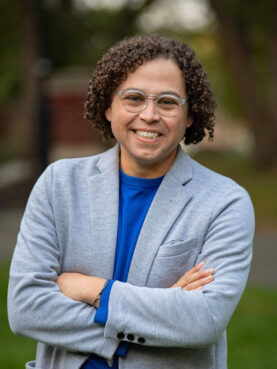(RNS) — Headquartered in a South Boston building in the city’s affluent Seaport District, the Unitarian Universalist Association happened to have a vacant sixth floor last summer just as Massachusetts’ governor declared a state of emergency to deal with the state’s rapidly growing migrant population.
The association, home base for more than 1,000 UU congregations across the U.S., has long supported the human rights of migrants and refugees, and earlier in the year, they had heard from some member congregations that had been wanting to host temporary shelters.
Using their sixth floor as a makeshift shelter, the staff quickly agreed, was a no-brainer.
On March 7, the 10,000-square-foot commercial space opened as an overnight shelter for homeless families with children and any pregnant person in need. Up to 80 people can be housed at the shelter, which features a kitchenette, a nursing and health station and open spaces filled with rows of green cots.
Many of those currently at the shelter are migrants who had previously been sleeping at Logan Airport. The temporary shelter is approved to operate through May 31, when the UUA plans to eventually re-lease the space.
According to UUA Executive Vice President Carey McDonald, the journey to opening the shelter was “very countercultural to the norms of commercial real estate,” and had everything to do with the UUA’s values.

UUA Executive Vice President Carey McDonald. (Photo © UUA)
“We went down this path because we’re a mission-based organization and we really uphold the inherent worthiness of all people, our interdependent nature of existence of which we’re all part, and our commitment to justice and equity and compassion and liberation in human relationships,” McDonald told Religion News Service.
The UUA has been headquartered in Boston for the last 150 years, and at their current location, a six-story brick building on Farnsworth Street, since 2014. The first three floors are used by UUA staff, while the other three are commercial rentals.
The state was already partnering with United Way, one of the world’s largest privately funded charities, to finance short-term overnight shelters in response to the housing crisis. After a series of site tours, meetings and inspections, the United Way’s Massachusetts branch awarded the UUA, the Black Refugee and Immigrant Community Coalition and Greater Boston YMCA a grant to operate the shelter at the UUA headquarters.
McDonald said that allowing temporary shelters in commercial buildings should be more commonplace, citing state officials who said that, of the 350 possible sites they have evaluated, only about eight have been cleared to operate as shelters.
“There’s millions of square feet of unoccupied office space in Central Boston,” said McDonald. “We were in a position, because we care, and are committed as a religious organization, to bridge the gap between what faith communities have been able to do and what I think that commercial landowners could do.”
The Black Refugee and Immigrant Community Coalition, a Boston-based resettlement organization, is managing and staffing the shelter and will provide case management services for the shelter’s families. The coalition will also play a role in finding job and housing placements for those at the shelter. During the day, families will receive showers, meals and support services at the YMCA of Greater Boston, and children will attend classes at local schools.
Massachusetts is the only state to have a right-to-shelter law guaranteeing that all families with children have a place to sleep, a mandate that has become difficult to live up to as of late. The state’s emergency assistance family shelter system has more than doubled its caseload in the last year, forcing some migrant families to sleep in emergency rooms and airports.
McDonald said that, while faith -based communities have long provided shelter and welcomed migrants, it’s time for other facilities to step up, too.
“That’s what I think it will take to move through this twin crisis of both our broken immigration system and the housing crisis that we have in our country, is broadening the base of institutions that are invested in those solutions and doing their part, and being much more creative.”
Discover more from CaveNews Times
Subscribe to get the latest posts sent to your email.


























![Exploring the Serene Beauty of Nature: A Reflection on [YouTube video title]](https://cavemangardens.art/storage/2024/04/114803-exploring-the-serene-beauty-of-nature-a-reflection-on-youtube-video-title-360x180.jpg)


























